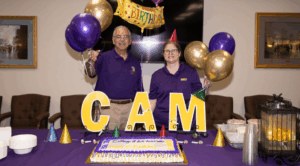Dr. J. Bradley Creed Show Relevance of Luther’s 95 Theses
Hardin-Simmons celebrated Martin Luther's 95 Theses.
Hardin-Simmons University celebrated the 500th anniversary of Martin Luther’s 95 Theses with guest speaker, Dr. J. Bradley Creed, a church historian and the president of Campbell University. Dr. Creed discussed why Luther was still relevant in today’s society through his lectures on October 30-31.
On Monday, October 30, Dr. Creed spoke on “Martin Luther, Baptists, and the Struggle of the Soul.” He described Luther’s personal journey in faith as a struggle of the soul. Luther continually felt unholy in the eyes of God, but eventually Luther experienced a breakthrough in finding peace with his relationship with God, which was provided by the epistles of Paul.
“Luther found peace not only in the grace of God, but also in the God of grace,” Dr. Creed said.
Dr. Creed described that the life of a believer is lived in the midst of polarities: the law and the gospel, God as hidden and as revealed, humans as sinners and as justified.
“Apart from the cross, God is a terrifying and unknowable God, “said Dr. Creed. “But the agonizing death on the cross showed us that He is a God of love and mercy.”
Dr. Creed connected Luther’s beliefs with today’s religious issues. He described the theory of Christian Smith and Melinda Lundquist Denton that many self-proclaimed Christians are actually practicing moralistic therapeutic deism.
“They believe that God wants them to be happy, because that is the most important part of life. They believe that being a good person will get them to heaven, and that the church is just a place full of nice people,” he said.
Dr. Creed reminded Christians of the basic foundations that Luther asserted in his 95 Theses. He emphasized the need not just for justification at the moment of salvation, but also for sanctification-living by faith every day.
Dr. Creed continued his demonstration of how this historical event still has an influence on the everyday life.
Dr. Creed opened up by providing background information on the town of Wittenberg and the life of Martin Luther. Luther is described as a man devoted to living the life of a monk, but had a trouble soul that was continuously looking for peace with God.
“Luther was on an intense quest for a gracious, forgiving God. He finally discovered what could give him release through an in-depth study of scripture,” Dr. Creed said. “Through reading the bible, he found a God that wasn’t most powerful through condemning his sins, this God is most powerful when he forgive through grace which we can only know through faith and trust.”
Dr. Creed related Luther to the humans in today’s society, saying that he was facing the same struggles for internal peace as we do daily. Dr. Creed added that through his discovering of peace with God, Luther gained the confidence to question acts of the church that hindered the deity of the crucifixion and resurrection of Christ, such as selling salvation.
Because of his renewed confidence in God, Luther proudly argued against the church’s hindering actions, creating tension between himself and the Holy Roman Empire. This did not stop Luther however; he helped changed these crooked ways and added to the reformation of the Protestant religion and our understanding of marriage and sexual relations between husband and wife that is still known and relevant today.
Dr. Creed concluded the celebration of the Theses with his lecture entitled “Martin Luther’s Baptist Legacy”, in which he emphasized how this historical moment was a major turning point in Baptist history.


